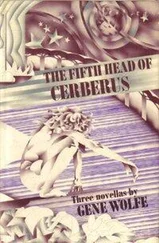House said nothing more, but Sherby could hear people running and shouting downstairs. It sounded as if House was showing the party again, and Sherby told himself that if it sounded like the party it couldn’t really be as bad as House had been pretending.
It was hard to decide which toys and books to take; in the end he settled on the yo-yo with the blinky lights in its side and the copter, telling himself that he could make the copter fly after him when he didn’t want to carry it. He put on his big puffy down-filled coat, buttoned the easy buttons, slipped the yo-yo into one side pocket and the copter control into the other, and went out onto the landing again.
Knecht Rupprecht was there, standing at the head of the stairs—but a new Knecht Rupprecht, hideously transformed. Shreds of decaying flesh dangled from his skull face now, his eyes were spheres of fire, and he was taller than ever; in place of his bundle of switches he held a sword with a blade longer than Sherby and wider than Sherby’s whole body.
People were clustered at the foot of the stairs staring up at him, arguing and urging each other forward. After a second or two, Sherby decided it might be better to go down the back stairs to the kitchen, but as he was about to turn away something very strange happened to Knecht Rupprecht: he vanished, reappeared, roared so wildly that Sherby took three steps backward, dimmed, and dropped his sword.
The lights went out.
Something knocked Sherby down, and something else stepped on his fingers.
A flashlight beam danced on the ceiling before it too winked out.
Sherby tried to crawl on his hands and knees. Somebody tripped over him and said, “Shit! Oh, shit!”
Something was burning in the hall downstairs; from where he lay, Sherby could not see the flames, but he saw the red light of them and smelled smoke.
Thick, soft, warm arms scooped him up. “Little boy,” the owner of the arms said in a voice like a girl’s. “Little cute boy. Don’t cry.”
Outside the moon was up, and some of House’s security shutters were lying on the snow-covered flower beds. Behind them, their windows glowed with orange light. Thick black smoke was coming through the shutters over his mother’s and father’s bedroom windows.
Smoky galloped through a milling crowd of people. One threw a bottle at him, and there were popping noises. Smoky stumbled and fell, tried to get up, and fell again. Someone hit him with a snowball, and someone else with a big stick.
“You want to hit him, little boy?” the man holding Sherby asked. Sherby could feel the man’s whiskers scraping his ear. “You can hit him if you want to.”
Sherby said nothing, but the man set him down anyway. “You can hit him if you want to,” the man said again in his girl’s voice. “Go ahead.”
It would be better, Sherby thought, to do what they said. To be one. He got closer, not looking at the man behind him, stooped, and tried to scrape up enough of the trampled snow for a snowball. It stung his fingers and there wasn’t enough, so he found a rock and threw that instead.
The fat man picked him up again. “I’m going to call you Chris,” he told Sherby, “ ’cause you’re my Christmas present. You can call me Corporal Charlie, Chris.” He was bigger than anybody Sherby had ever seen before, not as tall as Knecht Rupprecht but wider than Sherby’s bed. “You come along with me, Chris. We’ll go on back to my van. You got cut, didn’t you?”
Sherby said, “Uh-huh.”
“I’ll put a little splash of iodine on that when we get back home. We—”
House’s roof fell in with a crash as he spoke. A great cloud of swirling sparks rose into the sky, and Sherby said, “ Oooh! ”
“Yeah, that’s somethin’, ain’t it? I seen it before. All these soldiers here are meaning to do some more, but you and me are going home.” Corporal Charlie chuckled. “We’ll take off our clothes and have some fun, Chris. Then we’ll go to bed.”
Corporal Charlie took up the whole front seat of the van, so Sherby rode in back with furniture and some dresses and a lot of other things. There was a thing there lying on some coats that Sherby recognized, and when he was sure that it was what he thought it was, he traded the copter control for it.
That night at Corporal Charlie’s house, when Corporal Charlie was asleep and Sherby was supposed to be asleep on Corporal Charlie’s smelly old sofa, Sherby got the thing he had found in the van out again. “Merry Christmas, Mouse,” he said to the shiny round lens in front. “It’s me, Sherby.”
But Mouse was quiet, still, and cold.
Sherby put her under the sofa cushion.
Christmas was funny, Sherby thought, snuggling underneath the coats. Christmas was happy and sad, green and red, real and fake, all mixed together. “I don’t like it,” he muttered to himself, but as soon as he had said it, he knew it was not true. He wished—somehow—that he had been nicer to Santa Claus, even if Santa Claus was not real.
Afterword
Do you know how M. R. James came to write all those great old ghost stories? He wrote one a year, no less and no more, to read to his family at Christmas. We associate ghost stories with Halloween now—see Neil Gaiman’s marvelous “October in the Chair”—but ghosts at Christmas are far older. The three seen by Ebenezer Scrooge are not the beginning but almost the end of a lengthy tradition. If you were to return as a ghost, wouldn’t you rather revisit your family at Christmas?
So I hope you noticed the ghosts, and that you noticed (as only a few readers do) that there is an anti-Santa, too. Poor Sherby rejects Santa Claus and gets someone much worse.
Iknow an old couple who live near Hell. They have a small farm, and to supplement the meager income it provides (and to use up its bounty of chickens, ducks, and geese, of beefsteak tomatoes, bull-nose peppers, and roastin’ ears) open their spare bedrooms to paying guests. From time to time, I am one of those guests.
Dinner comes with the room if one arrives before five, and leftovers, of which there are generally enough to feed two or three more persons, will be cheerfully warmed up afterward—provided that one gets there before nine, at which hour the old woman goes to bed. After nine (and I arrived long after nine last week) guests are free to forage in the kitchen and prepare whatever they choose for themselves.
My own choices were modest: coleslaw, cold chicken, fresh bread, country butter, and buttermilk. I was just sitting down to this light repast when I heard the doorbell ring. I got up, thinking to answer it and save the old man the trouble, and heard his limping gait in the hallway. There was a murmur of voices, the old man’s and someone else’s; the second sounded like a deep-voiced woman’s, so I remained standing.
Their conversation lasted longer than I had expected, and although I could not distinguish a single word, it seemed to me that the old man was saying, “No, no, no,” and the woman proposing various alternatives.
At length he showed her into the kitchen, tall and tawny haired, with a figure rather too voluptuous to be categorized as athletic, and one of those interesting faces that one calls beautiful only after at least half an hour of study; I guessed her age near thirty. The old man introduced us with rustic courtesy, told her to make herself at home, and went back to his book.
“He’s very kind, isn’t he?” she said. Her name was Eira something.
I concurred, calling him a very good soul indeed.
“Are you going to eat all that?” She was looking hungrily at the chicken. I assured her I would have only a piece or two. (I never sleep well after a heavy meal.) She opened the refrigerator, found the milk, and poured herself a glass that she pressed against her cheek. “I haven’t any money. I might as well tell you.”
Читать дальше










